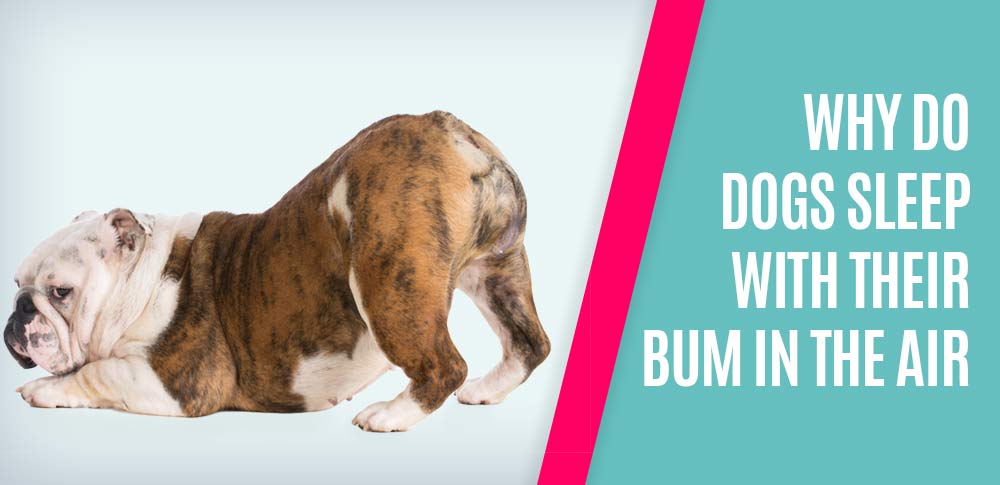Why did your dog suddenly change its position and now prefers to sleep with her little butt in the air?
That posture looks super uncomfortable. So why is it sleeping that way?
Why do dogs sleep with their bum in the air
Dogs sleep with her butt in the air instead of her regular sleeping positions as a result of fatal health conditions like pancreatitis or peritonitis. Some dogs, however, sleep with their butts in the air for the fun of it.
So it is perfectly normal in such cases if you don’t observe any symptoms of distress.
Find out more about the common reasons below
Sign of Pancreatitis
If your dog constantly falls asleep with its butt in the air, you might consider visiting a vet to ensure it is not in severe abdominal pain.
When dogs sit or lie on their stomach, the abdomen bears a significant amount of their body weight.
If it is sore or painful, they may try to reduce this weight by balancing their forelimbs with their heads down and their butt in the air.
Hence the ‘butt in the air position.
Most times, it’s a way to minimize the weight on the abdomen of your dog — a clear sign that they may be experiencing some discomfort with their body weight resting on the hind limbs.
There are different causes of abdominal pains in dogs. But the most common reasons that could lead to the butt in the air sleeping position occur due to pancreatitis or bloating.
Pancreatitis is often severe and life-threatening for dogs. So you might want to consider getting a vet sooner rather than later.
A few symptoms to look out for in addition to the change in your dog’s sleeping position are
- weakness,
- regular vomiting,
- loss of appetite, and
- dehydration.
Also, you should observe the stomach and see if it is bloated (distended).
Sign of Peritonitis
Peritonitis is also a painful and often fatal condition in dogs.
Peritonitis is an inflammation of the peritoneum — the membrane lining the abdominal cavity of your dog.
Most dogs with this condition usually are unwilling to lie down on their stomach due to the severe pain associated with the sleeping posture if they develop peritonitis.
While your dog sleeping with its butt up in the air is certainly not a confirmation that your dog is suffering from abdominal pains caused by inflammation of the abdominal lining, it is an excellent sign to act upon.
Other symptoms you might want to watch out for include
- weakness,
- rapid breathing,
- black stool,
- diarrhea,
- loss of appetite,
- vomiting, and
- decreased excretion.
This inflammation can occur spontaneously or due to an underlying condition. Whichever is the case does not matter at this point.
You will need to take your dog to the vet for emergency treatment since peritonitis is fatal, with a mortality rate of 50%-70%.
Lack of Exercise
Like humans, your dog’s body is made of muscles, bones, and ligaments.
It needs to work constantly to stay healthy and feel comfortable in its body.
If you have not been taking your canine friend out for regular walks or play, it tends to stretch frequently to relieve some of the cramping that comes with being idle.

You will often see your dog stretching its body constantly, tossing and turning while sleeping, or having her butts in the air to stretch her back muscles.
Dogs love open and expansive sleeping areas as much as kids love playgrounds.
If you feel your dog’s sleeping changing over time, it is also likely that your canine friend is growing and requires more space to spray out and have her nap
Exhibiting Calming signal
While this is the most unlikely reason your dog is sleeping with her butt in the air, it is a good reason why most dogs often get into the butt in the air position in the first instance.
Dogs cannot communicate their feelings with words, not even to other dogs.
So even though they make barking sounds, it rarely is sufficient to communicate effectively with one another.
As such, they instinctively combine their barking sounds with body language to be more expressive and communicate their needs to owners or other canine community members within the vicinity.
One such calming signal includes your dog bending its head to the ground, the lower jaw almost making contact with the floor, and its back arched upward.
This can quickly put it in the ‘butt in the air position.
This position is usually called ‘play bow.’
Your dog will usually get into the play bow position to show that they want to play with you like a friend playfully inviting you to a playful wrestling session.
However, a few dog breeds do this a lot more frequently than others and may even remain in the position until they doze off.
Bloat
Bloat is a medical emergency and one of the fatal conditions in dogs that need immediate attention. If left untreated, bloat can kill a dog within a few hours.
When bloat occurs, the stomach gets filled with gas, becomes swollen, and sometimes becomes twisted, preventing blood circulation and oxygen to the cells of the gastrointestinal system.
Bloat can also cut blood supply and nourishment to the spleen and the heart.
In addition, it is excruciating for dogs, and bloated dogs tend to find it hard to sleep with their stomach on the ground due to the distension.
Often, a swollen and stiff stomach is the most significant pointer to bloat in a dog.
So if your dog suddenly finds it difficult to lie on her stomach, you might want to reach out and feel her belly.
Gently feel it with your fingers and watch her reaction to see if it winces back in pain.
Other symptoms of bloating include loss of appetite, retching but not vomiting, and drooling. Your dog might also become restless if it is bloated.
Filled Anal Sac
The anal sacs are two small pouches on the left and right sides of a dog’s anus.
They are also called anal glands because each sack contains several sebaceous (sweat) glands.
The sebaceous glands secrete a foul-smelling (at least to the human senses) fluid that is usually stored in the anal glands.
Dogs release some of these fluids each time they poop or pass urine.
The secretion adds a distinctive odour to your dog’s urine or feces.
This characteristic odor helps your dog map out its territory and enables other dogs to recognize it quickly.
It is why dogs are often in the business of smelling other dogs’ butts each time they meet.
Most dogs will go through life without ever experiencing any problems with their anal dogs. But once in a while, your dog’s anal sac might become infected or inflamed.
This makes it almost impossible for your dog to pass out those secretions without some physical help.
In addition, if left unattended, the fluid can collect in the sac over a few days, making life difficult for your dog.
A common sign of filled anal sacs in dogs is scooting or seeing your dog almost dragging its butt on the ground.
That may sound like a counterpoint since your dog is putting its butt in the air.
But expression varies in dogs. For example, some dogs, though relatively rare, often express the problem of a clogged anal sac by raising their butts from the ground.
Most times, all that is needed is a visit to your vet to have your dog’s anal sac cleaned out, and it’ll be back to its usual self again in a few minutes.
To be sure that your dog is sleeping with her butt in the air due to her clogged anal sacs, you might want to pay attention to a few other symptoms.
For example, if it is excessively licking her butt area, has blood or pus in her stool or has difficulty stooling, then chances are her anal sac is clogged.
It may just be cooling off
It probably may not be a reason for you to worry if your dog suddenly starts sleeping with her butt in the air.
She probably discovered that the position is much more comfortable than her former sleeping position and is already making changes.
But unfortunately, there is no defined sleeping posture for dogs, just as there is none for humans.
Some dogs, especially those from the Chihuahua and Pug stock— the chugs, might be more in this sleeping position than any other dog breed.
It’s only a way for them to cool off faster, just as some might prefer to dig around your yard looking for a cool spot.
The above are possible reasons your dog may have suddenly started sleeping with her butt in the air.
But, like everything else, when it comes to dogs, it all boils down to your ability to pay attention to changes in her behavior and make your guesses.
So, if you observe other symptoms of concern in your dog and now she is changing her sleeping position, then you may need to visit a vet soon to ensure she is not in severe pain.
Other than that, she may be exhibiting a calming signal or trying to cool off after a hateful day.


